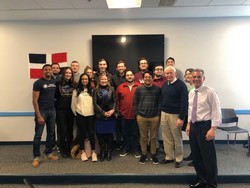Two former drug addicts, who now identify themselves as being in long term recovery, spoke to about 70 Monmouth University students and faculty members at the third annual “What is Life Like in Recovery?” event in Magill Commons on Tuesday Nov. 17 at 7:30 p.m.
These individuals, who are both university alumni, spoke openly about their experiences with substance abuse. The first speaker, Lauren, discussed how she started drinking alcohol and smoking pot in high school and by age 19 she was a dependent heroin IV user. She explained how her addiction altered her life and rid her of her morals and values. “In the midst of my addiction everything fell to the wayside. I dropped out of high school, I stole from everyone I was around, and my family kicked me out of the house,” she said.
She was able to start her path to recovery through a 12 step fellowship program that she is still a member of today and has now been sober for three years. “Today I can tell you that my life is much better and that I am now able to be a member of society,” said Lauren.
Lauren explained how she chose to share her story in hopes that it will reduce the negative stigma that is often associated with substance abuse. She also pointed out how it is important for people who are recovering from addiction to come together and to never isolate themselves.
David was the next speaker and he has been sober for six years. He emphasized how addiction is a mental illness. “I had a lot of anxiety and drugs made me feel ok. Drugs are not my problem, they help me feel better, they fix me,” he said.
He defined the difference between addiction and physical dependence. Physical dependence is when an individual cannot stop taking a drug without going through withdrawals while, addiction is when an individual enjoys the effect drugs give them and is constantly craving a high.
Dave was also an IV heroin user and during the last two years of his addiction he described how he would have done anything to stop. He too started his recovery with a 12 step program. He was watching the sunrise after he had been sober for 90 days and, “out of nowhere I started to cry. It was the first time I felt connected to life without drugs. That is what recovery is,” he said.
“The main message I took away is that it can happen to anyone and there are people on campus right now who I might not even know are addicted to such deadly drugs such as heroine,” said Nikolas Guarino, a sophomore business finance student and president of Theta Xi fraternity. “The main thing that stuck with me is that if you see someone suffering from drug or alcohol abuse, whether it’s a friend or a classmate, you should get them help early and not let it progress further.”
Suanne Schaad, Substance Awareness Coordinator at Monmouth University, said that this has become an annual event because, “Students need to know that there are students on campus who are in recovery. They also need to know that there are resources and services for them on campus that are free and confidential. If a student is struggling they need to know they are not alone.”
The Office of Substance Awareness is a free service where students who are struggling with substance abuse can get free and confidential help and can be found in the student health center.
Casey Smith, who is currently the Treasurer of Counseling Students Association (CSA) and a graduate student studying mental health counseling, described how the speakers were brave in sharing their story. “As a future counselor, I love hearing from people in recoverytell their story. Getting to know their background andwhat they did to overcome their struggles really puts things into perspective. It isn’t enough to just read it ina textbook. Both students were really brave getting up infront of complete strangers. It isa completely vulnerable situation and the students that attended were supportive and actively listened which I know the speakers appreciated.”
There was a question and answer portion at the end of the event where the speakers welcomed any and all questions from the audience.
This year the room was filled to capacity and there were few if any empty seats. Attendees were offered refreshments before and after the event.
Sponsors of the event included the Office of Substance Awareness, MU Students in Recovery, Council for Exceptional Children, Phi Kappa Psi Fraternity, Lambda Theta Alpha Sorority, Lambda Theta Phi Fraternity, Counseling Student Association, Social Work Society, and Theta Xi Fraternity.


